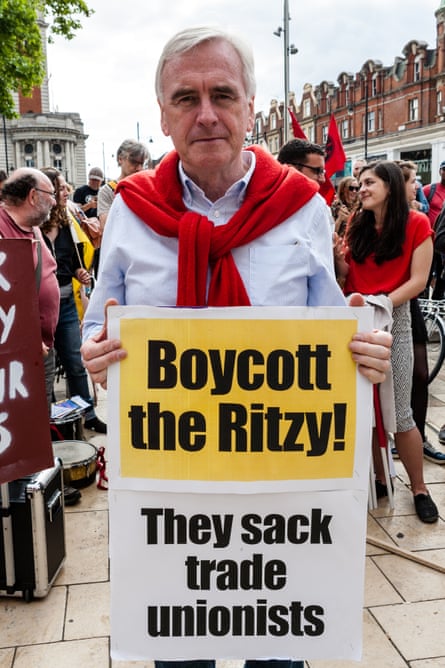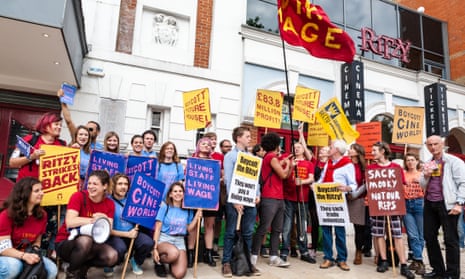It is a saga that tells us much about a country rigged in favour of unscrupulous employers, and a society riddled with injustice. The Ritzy cinema in Brixton, south London, is a hub for the young, the trendy, the progressively minded. Here you can watch rousing films with storylines about confronting oppression and injustice, while you are served by workers on poverty wages being persecuted by their own employers. Picturehouse – the owner of the Ritzy – should be shamed, but it tells a broader story of a wealthy nation in which the majority of those below the poverty line are in work, of a law that allows bosses to behave with impunity while denying workers a wage on which they can live, and of a lack of security and rights. It seemed reasonable to hope that this week’s long-awaited Taylor review into modern employment practices might have begun to address this crisis. Some hope.
But then the Ritzy cinema workers have long ceased relying on hope. They have been fighting for years now for a living wage, despite entrenched opposition from their employers. One day it will be a source of bewilderment, perhaps disgust, that any worker could earn their poverty wages. Those who fought such a scandal will be regarded as pioneers; Picturehouse owners should realise that history will be less kind to them, that they will be remembered as case studies of exploitation and nothing else.
This is not some plucky struggling arthouse firm: Picturehouse is owned by the corporate titan Cineworld. After a protracted campaign by workers that won broad local support, in 2014 Picturehouse appeared to buckle, offering workers the London living wage, which at that time was £8.80 an hour. But it turned out the increase in wages would be paid for by sacking up to a third of the workforce. The outrage – including calls for a boycott – forced Picturehouse into retreat.
Other cinema chains – the Curzon among them – have committed to increasing their workers’ pay in line with the increased London living wage, now at £9.75 an hour. Britain’s capital, after all, is one of the world’s most expensive cities and the centre of the country’s housing crisis, and low pay here is particularly incompatible with a decent standard of living. But Picturehouse has refused, despite its multimillion profits, forcing its workers to resume industrial action. A ballot for strike action earlier this year received almost unanimous support on a 75% turnout, with workers walking out of multiple cinemas. The response from bosses was to threaten legal action over claims of intimidation and illegal pickets.
Certainly, workers have felt intimidated. “They’ve been incredibly belligerent from the beginning, refused to negotiate, brought in lots of lawyers, issued legal threats,” one tells me. In solidarity with the Ritzy workers, supportive members of the public block-booked cinema tickets. They didn’t pay for them: they were merely in their online baskets, preventing others from booking tickets. Here was an effective, ingenious even, means of solidarity.

When one worker sent an email to the union branch explaining what had happened and asking what activists thought about it, management responded. They accused the emailer of being complicit in a cyber attack. Others were accused of receiving information about the “cyber attack” and failing to report it. Dozens received it: but only four were singled out for dismissal. And all four of those workers happened to be union representatives.
This looks like an excuse to crush the campaign. Three of the four have so far lost their appeals: they are now bringing their bosses before a tribunal. The workers believe Picturehouse would prefer to lose at tribunal and be forced to pay compensation if it means sacking activists and demoralising everybody else. “It’s shaken people up a bit, but it’s not working,” says one worker.
To the chagrin of bosses, the campaign is spreading. While only one cinema was organised previously, the campaign has spread to six. Every strike picket outside the Ritzy is met with growing bands of fellow cinema workers. “Even under onerous conditions imposed on us by the company, we’re still recruiting people into the union,” I’m told. “We’re growing in a number of cinemas across the country. That’s the hopeful thing about the campaign: we continue to grow.”
Agata Wanda Adamowicz is one of the Ritzy’s workers: she believes that the dispute exposes a law firmly rooted on the side of bosses. “It shows you can have every devoted worker fighting, you can have local support, you can have the mayor of London – and yet nothing can be done.”
For Agata – who is from Poland – there is another bitter side to the dispute. It has become all too common for migrants like her to be scapegoated for social ills caused by others. Here she is, a Polish worker fighting for a decent wage for her and her fellow workers, in a country where it has become fashionable to blame migrants for suppressing wages. “Why don’t you blame the employer?” she implores. “It’s got especially worse in the Brexit climate: all this trying to find blame in the wrong places.”
Picturehouse workers deserve support and solidarity on their own terms. Their arthouse cinemas in many British cities should be boycotted. They are not just fighting for themselves: they are fighting for all workers blighted by low pay, oppressive bosses and insecurity. Their struggle is helping to drive all these injustices into public consciousness, and is gaining political support. Indeed, at the beginning of July, I was joined on the picket line by Labour’s shadow chancellor, John McDonnell.
Cleaners at the London School of Economics have themselves recently won a long-running struggle to be brought in-house, granting them the rights and security they lack at present. But any workers’ victory can be eroded and reversed in the Britain forged by Thatcherism. Our social order protects and defends the Picturehouse employers. This must end. Britain’s low-paid workers desperately need a pay rise: not just in the public sector, but among private-sector workers such as the Ritzy cinema’s.
Our current political consensus makes that impossible. It must be overturned and a new working landscape built in Britain – partly created by the struggle of these workers. Their battle is our battle. The only losers in this would be the unscrupulous and the greedy.








